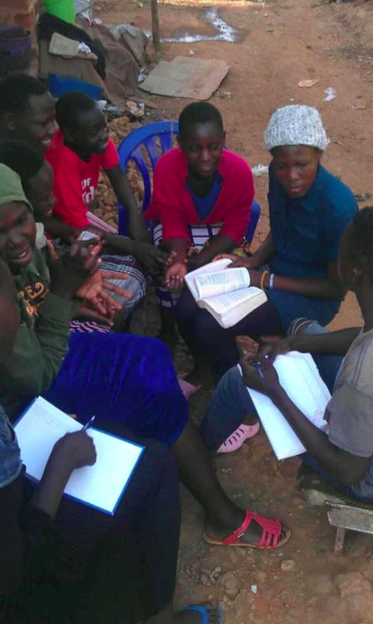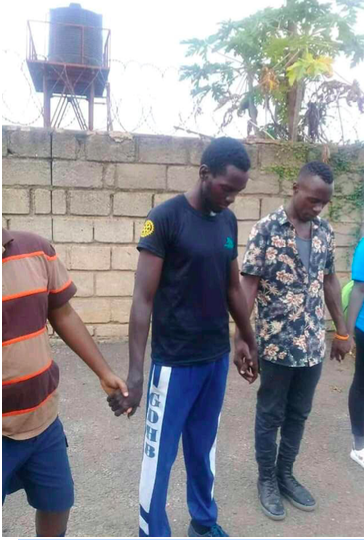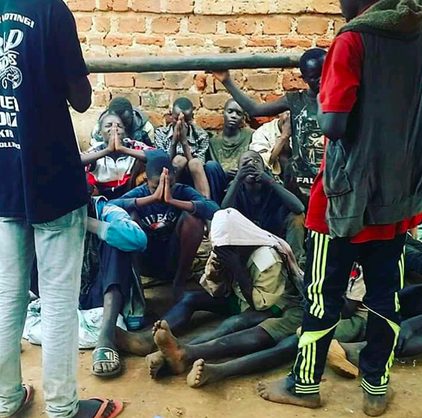Guest column by Musisi Hashim, Edited by Mackenzie Bills
My name is Musisi Hashim. I am a 30-year-old lover of God, recovered drug addict, and an avid swimmer. This is my testimony. The story of how I came before God and how God transformed my life; from the life in the ghettos of Kampala to a leader and soldier of Christ.
I grew up in the ghettos surrounding Kampala, the capital city of Uganda, an East African country, in an area called Kisenyi, one of the most prominent ghettos in Kampala. It is located in Kampala’s central business district. Growing up, the dwellings of this slum at the time was a combination of unburnt bricks, mud, poles, and cement blocks. Roofs were thatched or rusted iron sheets and floors were mixtures of stone, cement, tile, and mud.
According to Uganda’s National Population Housing and Consensus 2014, 67% of the population live in detached shacks and a further 12% in semi-detached residencies. Many of these are found in the ghettos or slums of the country, much like Kisenyi. Much of the slum populations rose in the early 2000s and simultaneously, its living standards decreased. This was due, in part, because of the rise in the urban population due to rural-urban migration which results in many unemployed youth moving into the city searching for opportunities which are in most cases non-existent. Many, like my family members, tried for these opportunities and when opportunity was absent, they up and left the ghettos, such as my hometown ghetto, Kisenyi.
Life in the Ghetto
Life in the ghetto was, and is, difficult. A community that lacks belonging. Where only the fittest prevail. You go where the wind takes you and where opportunity arises. Crime rates are high, unemployment levels are high, and sanitation is only an idea. Access to water and health facilities are slim. People must be resourceful, entrepreneurial, and competitive to make it past the young age of 20. Often times luck is the only thing that gets one through.

Life in the ghetto is characterized by drug and substance abuse, petty theft, sex, indiscipline, hostility, drunkenness, and divisions to cope with the heavy stresses of life. And unfortunately, I was not immune. At the tender age of 15, I started a life of daily drugs and substance abuse — a time in one’s life when you should be concentrating on studies. This was fueled by the relationships I developed with the street kids in the area who were also drug fanatics. The laxity of my home environment instilled a stubborn and wild character in me. I needed something more, outside the struggle, and the drug lords, druggists, and pimps surrounding me offered me these liberating opportunities. They were the kings of the ghetto. Of the people, they were leaders, they owned their lives in ways that I only imagined in my dreams. Because of them, I decided to lead a life of drugs. I wanted to be an “in,” not “out.” I wanted to be important. I wanted to be someone.
Trials
With regard to the drug and substance abuse, my first trial was with marijuana. It was exhilarating. It was uncomfortable the first time I smoked marijuana, but later, as I became more acquainted with it, it was exciting, relieving, awakening and put me in the mood of being able to attempt at doing anything and most cases, becoming daring. It made me have a feeling that I could take on anything and that the world was suddenly navigable. The most dangerous part of the experience was that it always made me feel full. I was never hungry. This meant that I lost a dangerous amount of weight. Thin and drugged, I decided to try out stronger substances like cocaine, white and brown sugar, myrrh, fuel jet, petrol, and glue that was often used to repair shoes. These are drugs that create an illusion. An illusion that life is good and will. At the end of it all, I chose to stick to marijuana. Drug and substance abuse in the ghetto is done in the open. Though you had to be very cautious not to be caught by law enforcement officers. Given the fact that use of marijuana and other substances has yet to be legalized in Uganda, my life was like a game, something in between a political game and hide-and-seek. More so given the poverty levels in the ghettos, backstabbing was the order of the day. Your kin would give you in to the law enforcement officers for a meager fee, all because it would would enable them to eat. The high of the hide and seek game was fun but the consequence, if caught, were not fun at all. Once caught the penalty would be imprisonment for years, in a barely functioning, rotting, disease-infested cell. No one wanted to fall victim.
Drug Abuse
The drug abuse continued on, even during my high school days and continuing into my later years till the age of 26 years. Somehow, I was able to keep my family members in the dark about my drug escapades which led me to venture into becoming a Disco Jockey (DJ), a job that was popular at the time. It was classy being a DJ and at such a young age the world was all yours. The fame, money, the women, alcohol, sex, you name it. This was an easy addition to part of my daily routine. All this greatly affected my education and I later made up my mind to leave high school at the age of 21 (In the Uganda Education system, high school is divided into two; lower (Certificate of Education) and upper (Advanced Certificate of Education). It is only after completion of the upper /Advanced Certificate that you can qualify for University Education). Seeing it was a waste of my time and money, I preferred the freestyle life compared to the structured school life.
At the age of 22, I signed a DJ contract in Mombasa, a city in Kenya. Given that this was one kind of a job I was engaged in during my teenage years, it motivated me to relocate to Mombasa. During my stay, I developed an interest to become a truck driver. My father was a truck driver, so I thought I would try it out. So I made up my mind and decided to learn the art of truck driving. I drove trailers. This meant that I had to cope with driving for long hours. The role involved ferrying goods, to various locations in the East African region, stretching from Uganda, Kenya Rwanda, and the Democratic Republic of Congo. This role required that one to spend long hours on the road which meant I had to be awake most of the time. To stay awake, I had to maintain my drug and substance abuse lifestyle. I smoked over 200 sticks of marijuana in a week.
A New Career
The truck driving career led me to be employed by a prominent firm that transported produce and other goods in and out of Uganda. This led me to a particular life-changing adventure. This adventure took me to South Sudan, a country north of Uganda. The country was, and is, very unstable. My experience in Southern Sudan was a contradiction. Both breathtaking and life threatening. It was an experience that involved driving through battlefields, driving over dead bodies, interacting with civilians and rebels, sometimes difficult to decipher which was which. These interactions kept us alive. By befriending the locals, they would in turn protect me. It was always a celebration when I returned home, alive. I hated the job. I never knew if I would return back to my family. The only thing that kept me returning was the money. It was a life of luxury. However, we continuously wondered if we would be able to use the money. If we would ever make it back, alive, and to continue on with our lives.
In 2012, my employer signed a new contract which required us to transport food to areas of South Sudan and Sudan. Rebels and soldiers all needed food, resources, and assistance. The fighting was beginning to gear up. Tensions were high. With such little development, it was unclear who we were sending food for. Whether they were the good guys or the bad guys. And if they would think of us the same. These were some of the most risky of tasks. It is was a perfect gamble. I knew I had a 50/50 chance between life and death. Fortunately for us, the civilians and rebel communities were friendly and they happened to lead the same lifestyle, one filled with weed and hoping to make it to the next day. This allowed us to befriend each other.
Time
A year passed and I had seemed to make it through. But then, in 2013, the war in South Sudan broke out. Unfortunately, this happened as I was en route to the country. We had to cancel the task to ensure our safety. We eventually had no choice but to drive onward to South Sudan, to make the food deliveries. We ended up being stuck in the battlegrounds for 3 months. There were days where we had nothing to feed on but water from ponds, stale biscuits, fruits from trees. Finally after three months, the fighting stopped. We proceeded to our final destination in the rebel camp and then back to Uganda.
Once back home, I had a moment to evaluate my life and the experiences I just witnessed. I reflected on my 10 years of drug and substance abuse and all the bad activities that came along with it. I started to think of what was best for my life. The kind of life I wanted. One of safety, security, and trust. I realized, life of drugs and substance abuse, traveling between countries, was not it. It was the most disturbing and terrifying moment of my life. A moment where it dawned on me that in life, one is entirely responsible for every decision they take. the direction they choose, steers their lives. It was one of the loneliest times of my life having abandoned the drugs that had become an addiction. The most difficult and trying moments when I felt the urge to get back to drugs and yet, simultaneously, I knew the consequences. I had no one to confide in. I knew at that moment, everyone thought I was crazy deciding to quit.
Transitions
The transition was also not an easy one since I had to most of the journey do it alone. I took a leap. I decided I would do it without my friends. Family. Loved ones. I had decided to reinvent myself. Start anew. Develop my own life. One with emotions, true emotions. Felt without the muzzle of drugs dissolving them.
It is at this point of the intense reflections, I can say luck came my way. I started to meet and interact with several people involved in church planting and discipleship. But my family was one with a strong Muslim background and foundation. They did not want to be part of any decision or action that required me to leave Islam. The two theologies do not mix. This was another challenge in life which I continue to face though with time the home environment is a bit lazed since many more family members have converted to Christianity with time.
The Christians, Born –Again and Pentecostal Christians, greatly motivated me to have a second attempt at life, deciding to go seek the Lord. All I wanted at that point was change. A positive change. A transformation. I wanted a new life.
Going Home
When I returned home, I decided to visit one of the ghettos near a place where my parents built our family home. While visiting, I met a gentleman whom the youth called Pastor. Confused, I asked why he would be in a place given his corporate background? The pastor was a career banker but had a calling from God to reach out to the unreached people especially in the ghetto areas and ultimately, was transforming their lives.
From my few interactions, he intrigued me. He had a certain character that was rare. This was so refreshing given the fact that the people we had been interacting with were always judgmental. He was never judgmental. Always encouraging and supportive. Never be judgmental of people, but especially, of me. He did not care of my past nor where I was. He only cared where I was going.

He took steps to mentor us and trained us how to plant churches. Through this, he taught us how to be leaders. He always reminded us of God’s love for us despite our shortcomings. We saw a father and a friend. And we embraced it. As grace would have it, I found a friend. I found the pastor. And I found God.
My Journey Starts
This marked the start of my journey of becoming a leader and a disciple of Christ. The pastor enabled me to access many opportunities. He supported and inspired my dreams. He sent me to leadership programs and church planting training sessions. I was sent everywhere, even to Cape Town, South Africa. Suddenly, I meant something. I became someone.
I never expected to become a Christian and disciple At that point in my life, I had no idea what I wanted nor what kind of life I had going for me at the time. The world was my oyster and yet, I had not an idea where to go or what to do. From my Muslim roots to becoming a soldier of Christ. My life changed and I owe it to God Almighty. This smart transition led me to tackle one of the hardest decisions of my life. That was the addiction to drugs. The five year journey of getting off drugs, sexual immorality, and alcohol has not been an easy one but I finally overcame it. I can confidently say I have been off drugs and alcohol for the last five years.
This transition has seen me being called by God to serve the unreached people groups. Those that have been left out and forgotten. Those that find the ghettos as their homes, street kids, sex workers, LGBTI+ community, children with special needs (special focus in on children and person with neuro disorders/disabilities) and refugees.
Starting a Non-Profit
So, we started a non-profit organisation called Hearts Extended Uganda. We mentor, counsel, and share the Gospel of Christ with the unreached populations. We hope to have a Uganda with people with a changed mindset and positive attitude through discipleship and to create an enabling environment for these unreached people groups communities so that they achieve their full potential and become solutions oriented This motivates them to live a life of love for themselves and others. This in the end makes them ambassadors in their communities. We hope that by empowering and supporting these unreached communities, it will pave the way for great leadership and creation of safe spaces and therefore, safe communities. In the way that the pastor changed my life, I hope that I can multiply that effect, by supporting and helping that many more people.
Summary of Hearts Extended Uganda
Hearts Extended Uganda is an independent, non-governmental, non-profit organization. Established in 2014, Hearts Extended is legally registered as a Non-Governmental Organization under the NGO law in Uganda.

Hearts Extended Uganda H-E, seeks to promote and protect the rights of the disadvantaged and its operations revolve around three pillars dubbed the 3C’s; these are:
- Children of incarcerated mothers;
- Children with Special needs (all
forms of disabilities – Neuro and physical) through a project called “Austins Foundation Uganda” - Community Support for the unreached
people who include ghettos communities, street kids, sex workers, LGBTI
community, children with Special needs (special focus in on children and person
with neuro disorders/disabilities) and refugees.
Specific focus is on education, health and life skilling. Hearts Extended Uganda provides material, psychological, and advocacy support in order to further their education, health, and livelihoods.
Our long term goal under the community
support pillar (iii) is to have a Rehabilitation Center for the people groups
categorized as the unreached.










I’ve learned a number of important things as a result of your post. I’d personally also like to convey that there can be situation where you will get a loan and never need a co-signer such as a Federal government Student Aid Loan. However, if you are getting that loan through a classic loan company then you need to be prepared to have a co-signer ready to help you. The lenders will probably base their own decision on a few issues but the largest will be your credit standing. There are some loan providers that will furthermore look at your job history and make up your mind based on this but in most cases it will depend on your scores.